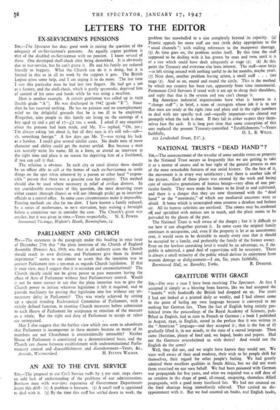PARLIAMENT AND CHURCH
Sla.—The statement in the paragraph under this heading in your issue of December 27th that "the plain intention of the Church of England Assembly (Powers) Act, 1919, was that in all ordinary cases the Church should reach its own decisions and Parliament give them its formal imprimatur" seems to me almost to assert that the intention was to convert Parliament into a yes-man as regards Church legislation. If that is your view, may I suggest that it is mistaken and unconstitutional? The Church clearly could not be given power to pass measures having the effect of Acts of Parliament without final Parliamentary control. Would it not be more correct to say that the plain intention was to give the Cnurch power to initiate whatever legislation it felt it required, and to provide machinery for passing that legislation into law without any un- necessary delay in Parliament? This was wisely achieved by setting up a special standing Ecclesiastical Committee of Parliament, with a strictly defined function, to examine Church measures before submission to each House of Parliament for acceptance or rejection of the measure as a whole. But the right and duty of Parliament to accept or reject are unimpaired.
May I also suggest that the further view which you seem to adumbrate that Parliament is incompetent in these matters because so many of its members are not Churchmen is constitutionally untenable? Neither House of Parliament is constituted on a denominational basis, and the Church can choose between establishment with undenominational Parlia- mentary control and disestablishment and disendowment—Yours, &c.,


































 Previous page
Previous page